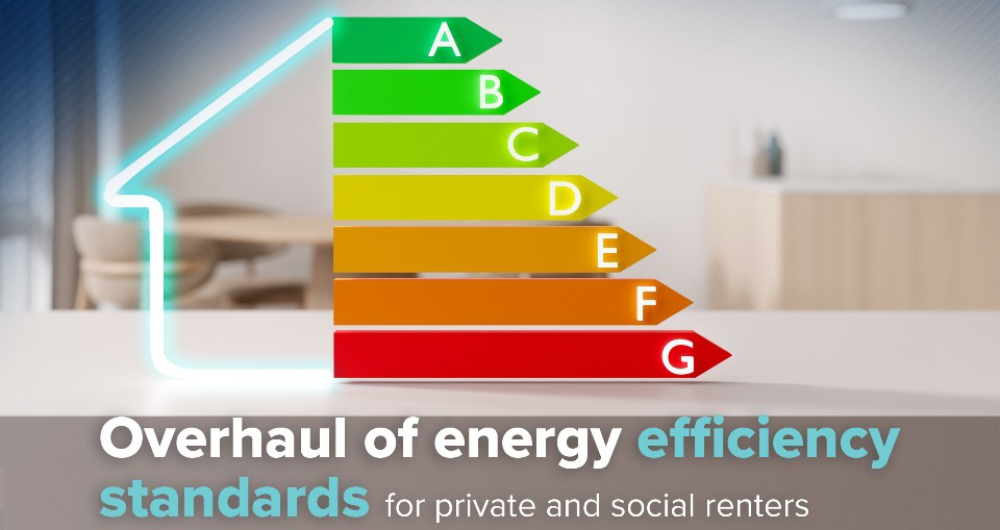Waves of warmer homes grants for the rental sector
Contents |
[edit] New plans to boost minimum energy efficiency standards for all rented homes
Over 1 million households are set to be lifted out of fuel poverty, as the government announces plans for the biggest potential boost to home energy standards in history.
Families across the country are continuing to grapple with the consequences of high energy bills amid a cost-of-living crisis – with too many tenants exposed to a harsh daily reality of cold, draughty homes and expensive bills.
Government intervention is now well overdue to transform living standards and deliver the safety and security of warmer, cheaper homes that are free from damp and mould.
The Energy Secretary pledged to take action to reverse these failures of the past and stand with tenants, with a commitment to consult by the end of the year on boosting minimum energy efficiency standards for private and social rented homes by 2030.
[edit] Consulting on a move from minimum EPC level E to EPC level C for all homes
Currently, private rented homes can be rented out if they meet Energy Performance Certificate E, while social rented homes have no minimum energy efficiency standard at all.
The government will now shortly consult on proposals for private and social rented homes to achieve Energy Performance Certificate C or equivalent by 2030.
[edit] Warm Homes; Local Grants and Social Housing Fund
The government has also announced a new Warm Homes: Local Grant to help low-income homeowners and private tenants with energy performance upgrades and cleaner heating, and confirmed the continuation of the Public Sector Decarbonisation Scheme, as well as the Warm Homes: Social Housing Fund, which replaces the Social Housing Decarbonisation Fund, to support social housing providers and tenants.
Today’s announcements kickstart delivery of the government’s Warm Homes Plan, which will transform homes across the country by making them cleaner and cheaper to run, from installing new insulation to rolling out solar and heat pumps.
[edit] Basis of the assumptions
The number of tenant households in fuel poverty which are set to benefit from higher minimum energy efficiency standards is a preliminary estimate using the DESNZ National Buildings Model based on the assumptions from the government’s preferred position in the 2020 consultation on Improving the Energy Performance of Privately Rented Homes in England and Wales . The same assumptions were also applied to social housing to estimate the impact of new standards in the social rented sector. This includes assuming an energy efficiency target rating of C based on SAP2012 and the estimate refers to fuel poor households in England only. No account is taken of other future policies that might interact, such as the Warm Homes: Social Housing Fund. Fuller analysis will be set out in an Impact Assessment for the Regulations.
[edit] Further guidance
Guidance for Local Authorities on the new Warm Homes: Local Grant, which replaces the Local Authority Delivery scheme, and which will start delivery in 2025. The expression of interest window for local authorities wishing to participate will open in October this year. Low-income, private tenants will be eligible for support, with the agreement of their landlord. Private tenants are also eligible for support under the Energy Company Obligation. Further details of the Warm Homes Plan will be set out through the Spending Review.
Guidance for Wave 3 of the Warm Homes: Social Housing Fund, which opens for applications in week commencing 30 September.
Guidance for Phase 4 of the Public Sector Decarbonisation Scheme, which is delivered by Salix Finance.
The government is also shortly planning to set out a consultation with proposals for certain improvements to Energy Performance Certificates (EPCs) to make them more accurate and reliable.
This article was issued via Press Release as 'Home upgrade revolution as renters set for warmer homes and cheaper bills' dated 23 September 2024.
[edit] Related articles on Designing Buildings
- Accredited energy assessor.
- Are Energy Performance Certificates accurate?
- Building performance.
- Building performance metrics.
- Certificates in the construction industry.
- Display energy certificate.
- Emission rates.
- Energy certificates for buildings.
- Home information pack HIP.
- How are EPCs produced?
- Minimum energy efficiency standard (MEES).
- National Calculation Method.
- Passivhaus vs SAP.
- Performance contracting.
- Performance gap.
- Simplified Building Energy Model.
- The Home Energy Model and Future Homes Standard assessment wrapper.
- The sustainability of construction works.
Featured articles and news
A five minute introduction.
50th Golden anniversary ECA Edmundson apprentice award
Showcasing the very best electrotechnical and engineering services for half a century.
Welsh government consults on HRBs and reg changes
Seeking feedback on a new regulatory regime and a broad range of issues.
CIOB Client Guide (2nd edition) March 2025
Free download covering statutory dutyholder roles under the Building Safety Act and much more.
AI and automation in 3D modelling and spatial design
Can almost half of design development tasks be automated?
Minister quizzed, as responsibility transfers to MHCLG and BSR publishes new building control guidance.
UK environmental regulations reform 2025
Amid wider new approaches to ensure regulators and regulation support growth.
The maintenance challenge of tenements.
BSRIA Statutory Compliance Inspection Checklist
BG80/2025 now significantly updated to include requirements related to important changes in legislation.
Shortlist for the 2025 Roofscape Design Awards
Talent and innovation showcase announcement from the trussed rafter industry.
OpenUSD possibilities: Look before you leap
Being ready for the OpenUSD solutions set to transform architecture and design.
Global Asbestos Awareness Week 2025
Highlighting the continuing threat to trades persons.
Retrofit of Buildings, a CIOB Technical Publication
Now available in Arabic and Chinese aswell as English.
The context, schemes, standards, roles and relevance of the Building Safety Act.
Retrofit 25 – What's Stopping Us?
Exhibition Opens at The Building Centre.
Types of work to existing buildings
A simple circular economy wiki breakdown with further links.
A threat to the creativity that makes London special.
























